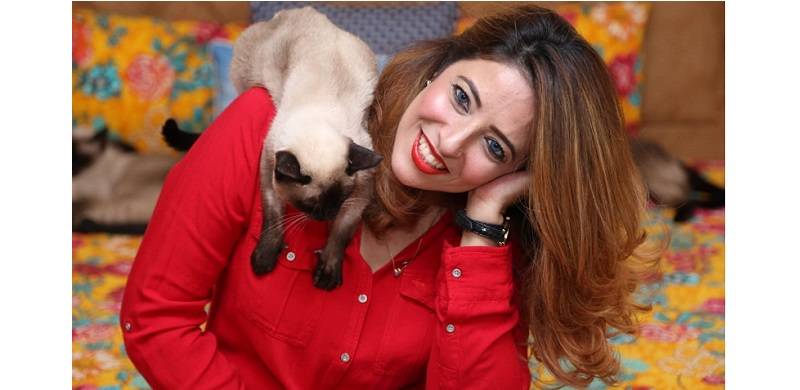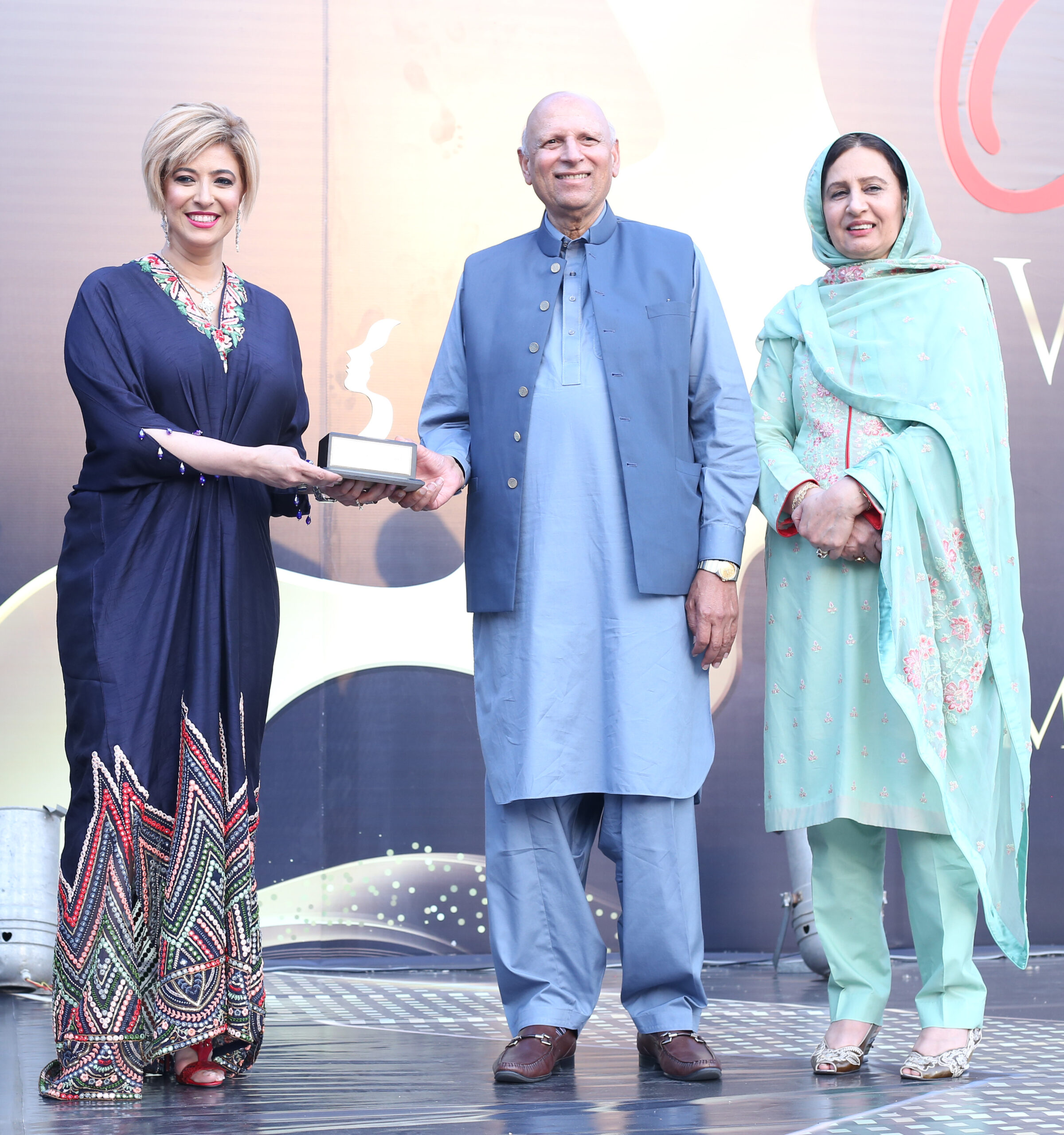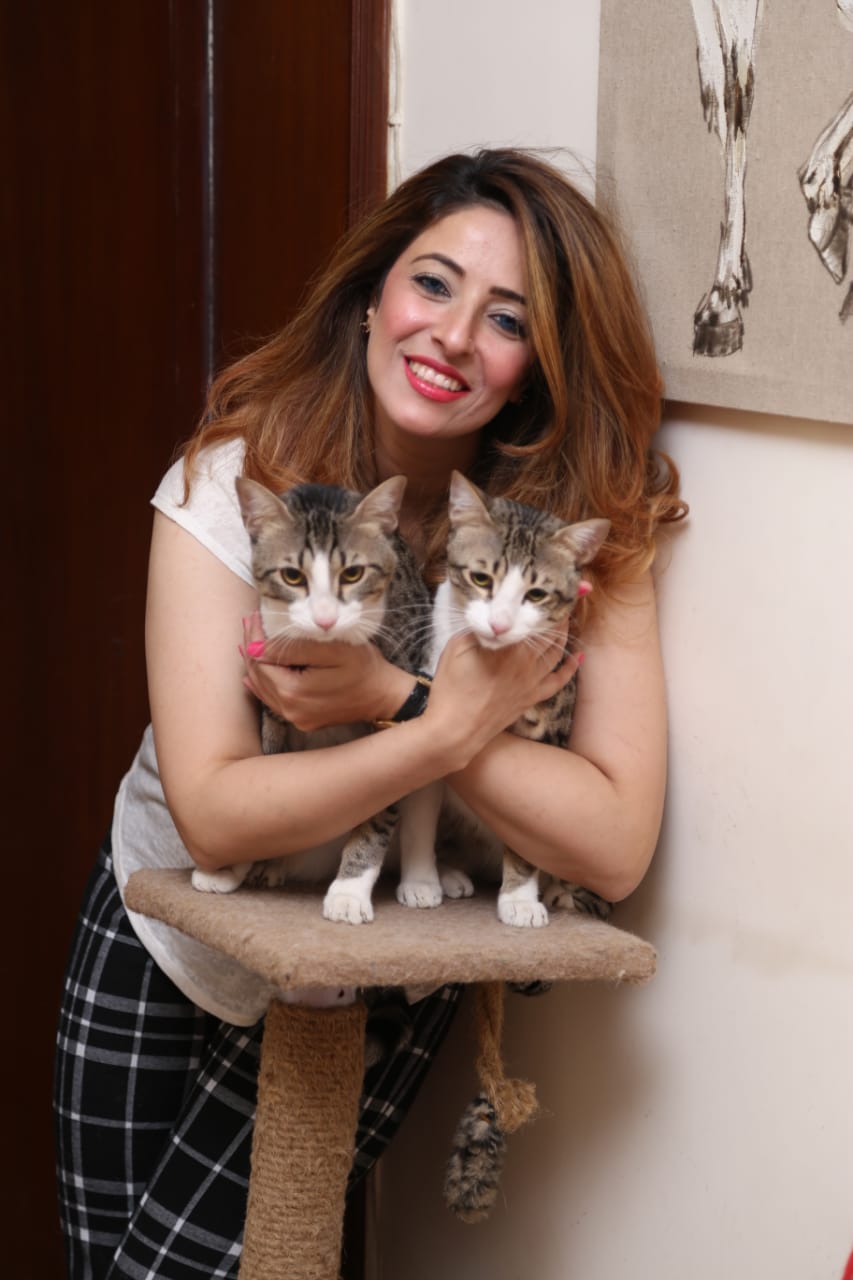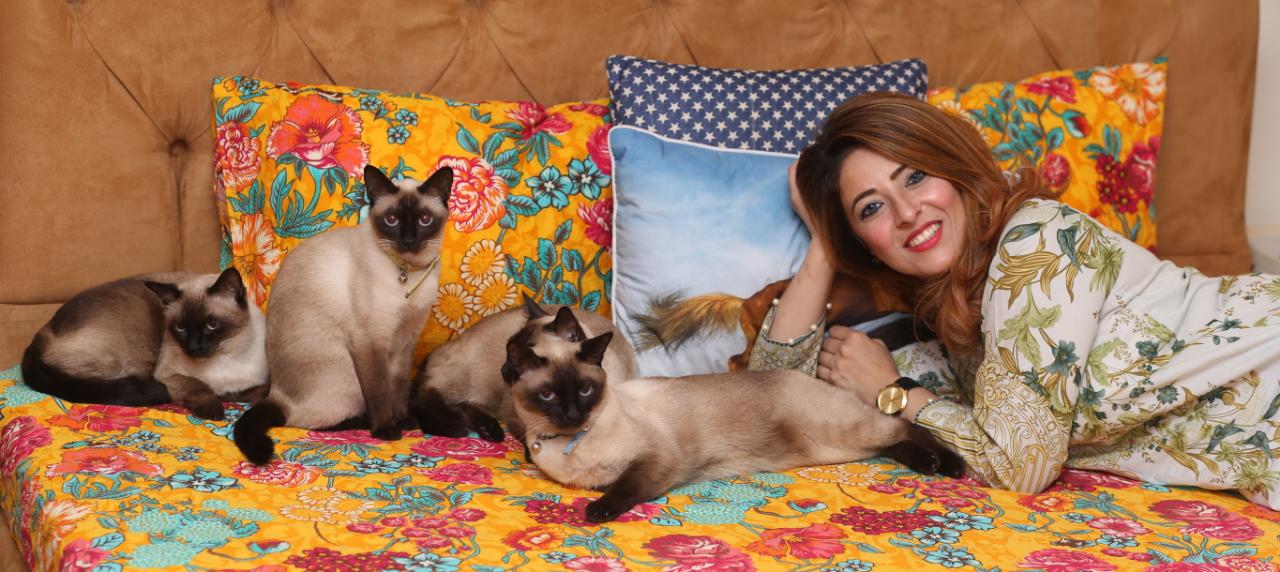
Sarah Gandapur is no stranger to the world of glitz, celebrity and red carpet hobnobbing. A familiar name in local fashion in the early 2000s, Gandapur has seen it all. From showcasing her fashion label at local and international fashion shows, collaborating with some of the biggest names in the local fashion industry, hosting events, award shows and running her very own publication with her sister, the fashion designer was an integral part of an era when the media boom was at its zenith.
But it was in 2015 that something within Gandapur snapped. A “wake up call,” she reveals, which turned her life around for good. The sudden loss of her beloved mother – her best friend and closest confidante in a world of fickle, fair-weather friendships – Gandapur felt a loss so acute, a personal identity so displaced, that she was compelled to retreat within.
 Her external environment almost felt cruel in its glaring alive-ness in the absence of her mother…it was sickeningly unfair. Gandapur was inconsolable, but she had a clarity of both thought and action, a clarity that only comes after one has faced an immeasurable loss which forces you to re-evaluate your life and the mechanics of your heart’s purpose.
Her external environment almost felt cruel in its glaring alive-ness in the absence of her mother…it was sickeningly unfair. Gandapur was inconsolable, but she had a clarity of both thought and action, a clarity that only comes after one has faced an immeasurable loss which forces you to re-evaluate your life and the mechanics of your heart’s purpose.
“Even though I always felt a pull towards human rights and animals rights from the very beginning,” she says, alluding to her upbringing where values such as compassion for the less fortunate and the voiceless were instilled in her childhood, “I began seriously focusing my attention more towards causes in 2015.”
Born in Bannu, Khyber-Pakhtunkhwa, in 1983, Gandapur reveals that she grew up in a family of animal lovers – from her parents to her older siblings.
“My father used to love dogs,” she says, “He used to make us save food for strays and feed them whenever we could. Sometimes I think the older generation was far more compassionate towards animals than we are.”
Rescuing animals since she was a teen, Gandapur adopted her first stray cat when she was 15-years-old. From thereon began her lifelong mission to continue adopting strays in need. “Each animal has its own distinct personality, just like us humans,” she says, mentioning that at one point, she had a grand total of 41 cats. Currently, Gandapur looks after 22 strays consisting of cats and dogs at her home in Lahore.
 “Animals are way more compassionate than most humans are. God has created them with as much feeling and emotion as we have. They have maternal instincts, they feel love, sadness, pain, depression, fear…they experience it all. When my mother passed away I was in a very bad place. She was the love of my life. I had never imagined losing her. But at that time, my oldest pet cat, Chloe, knew something was wrong and would just stick to me wherever I went. Just like my other pets. They were around me all the time. It was what I needed to pull through. There’s a saying that the best love is in the eyes of the animal you’ve rescued. But sometimes we don’t rescue animals, they rescue us.”
“Animals are way more compassionate than most humans are. God has created them with as much feeling and emotion as we have. They have maternal instincts, they feel love, sadness, pain, depression, fear…they experience it all. When my mother passed away I was in a very bad place. She was the love of my life. I had never imagined losing her. But at that time, my oldest pet cat, Chloe, knew something was wrong and would just stick to me wherever I went. Just like my other pets. They were around me all the time. It was what I needed to pull through. There’s a saying that the best love is in the eyes of the animal you’ve rescued. But sometimes we don’t rescue animals, they rescue us.”
Adopting and rehabilitating strays over the years, Gandapur reveals that she has faced her fair share of ridicule and criticism.
“They’d say things like; in a country where there are no human rights, here you are focused on animal rights! The thing is, no matter how hopeless man is, at least he can speak and ask for help…animals are completely helpless – they’re beizaban. Someone needs to do it for them and my aim has always been to be their voice.”
From visiting local educational institutions to deliver talks and seminars on animal empathy, speaking about animal rights repeatedly during her television appearances (on some of the biggest national talk shows), to working with government officials in Pakistan, Gandapur is one celebrity who has continued to use her clout for animal welfare.
“Even though local animal shelters are doing a good job, we honestly have a long way to go,” she says. “However, it’s a good start. But we need more people with money, influence and a fan-following to shoulder us in our mission. Because nothing comes out of one-off awareness campaigns; you have to find solutions for animal welfare on a long-term basis. Children need to be educated about animal empathy at home and in schools. I believe that those children who are cruel towards animals become violent and emotionally unstable in their adult lives.”
 Speaking of animal abuse that continues to take place on home turf, including horrific cases involving the sexual abuse of animals – particularly donkeys and dogs – Gandapur believes that the government and the media need to “step up” to tackle animal rights in Pakistan.
Speaking of animal abuse that continues to take place on home turf, including horrific cases involving the sexual abuse of animals – particularly donkeys and dogs – Gandapur believes that the government and the media need to “step up” to tackle animal rights in Pakistan.
“It’s a long and harsh fight but this is something we simply must do, it’s our duty as human beings, to defend the rights of every living being on this planet. If we don’t, what’s the point of calling oneself a human being?”
Having spearhead her own animal non-profit organisation, SAYAA Animal Welfare, which works in collaboration with Todd Shea’s CDRS Benji Project for Animal Welfare & Rescue, Gandapur states that she does see a shift in people’s mindsets towards Pakistan’s strays.
“From being ridiculed for years to now having strangers message me online stating how much they appreciate my work, inquiring how they can help out, I’m quite hopeful. Hats off to animal rescuers in Pakistan who are doing such a difficult, albeit noble job by saving animals from some of the most horrific and heart-wrenching situations.”
As an animal lover and activist, how does Gandapur work through staying afloat when new cases of animal neglect and abuse keep surfacing in Pakistan, particularly the incessant and barbaric cases of dog culling?
“It’s a struggle,” she responds, “But I believe in a higher power, I’ve put my trust in God. As I say this, it brings tears to my eyes because He took away my one, most prized possession – my mother. She was an amazing human being. That restores my faith in humanity. While there are some people that can be worse than monsters, there are others who do selfless work for people, animals and their country. They set the precedent so high that you’re forced to think, if they can do it, why can’t I? And yes, you do end up hating humans at times, but it gives you more motivation and a greater sense of purpose where you want to show the world that these animals are like children, that they too are also created by God.”
The author is a journalist based in Islamabad. She can be reached at: sonjarehman@gmail.com
But it was in 2015 that something within Gandapur snapped. A “wake up call,” she reveals, which turned her life around for good. The sudden loss of her beloved mother – her best friend and closest confidante in a world of fickle, fair-weather friendships – Gandapur felt a loss so acute, a personal identity so displaced, that she was compelled to retreat within.
 Her external environment almost felt cruel in its glaring alive-ness in the absence of her mother…it was sickeningly unfair. Gandapur was inconsolable, but she had a clarity of both thought and action, a clarity that only comes after one has faced an immeasurable loss which forces you to re-evaluate your life and the mechanics of your heart’s purpose.
Her external environment almost felt cruel in its glaring alive-ness in the absence of her mother…it was sickeningly unfair. Gandapur was inconsolable, but she had a clarity of both thought and action, a clarity that only comes after one has faced an immeasurable loss which forces you to re-evaluate your life and the mechanics of your heart’s purpose.“Even though I always felt a pull towards human rights and animals rights from the very beginning,” she says, alluding to her upbringing where values such as compassion for the less fortunate and the voiceless were instilled in her childhood, “I began seriously focusing my attention more towards causes in 2015.”
Born in Bannu, Khyber-Pakhtunkhwa, in 1983, Gandapur reveals that she grew up in a family of animal lovers – from her parents to her older siblings.
“My father used to love dogs,” she says, “He used to make us save food for strays and feed them whenever we could. Sometimes I think the older generation was far more compassionate towards animals than we are.”
Rescuing animals since she was a teen, Gandapur adopted her first stray cat when she was 15-years-old. From thereon began her lifelong mission to continue adopting strays in need. “Each animal has its own distinct personality, just like us humans,” she says, mentioning that at one point, she had a grand total of 41 cats. Currently, Gandapur looks after 22 strays consisting of cats and dogs at her home in Lahore.
 “Animals are way more compassionate than most humans are. God has created them with as much feeling and emotion as we have. They have maternal instincts, they feel love, sadness, pain, depression, fear…they experience it all. When my mother passed away I was in a very bad place. She was the love of my life. I had never imagined losing her. But at that time, my oldest pet cat, Chloe, knew something was wrong and would just stick to me wherever I went. Just like my other pets. They were around me all the time. It was what I needed to pull through. There’s a saying that the best love is in the eyes of the animal you’ve rescued. But sometimes we don’t rescue animals, they rescue us.”
“Animals are way more compassionate than most humans are. God has created them with as much feeling and emotion as we have. They have maternal instincts, they feel love, sadness, pain, depression, fear…they experience it all. When my mother passed away I was in a very bad place. She was the love of my life. I had never imagined losing her. But at that time, my oldest pet cat, Chloe, knew something was wrong and would just stick to me wherever I went. Just like my other pets. They were around me all the time. It was what I needed to pull through. There’s a saying that the best love is in the eyes of the animal you’ve rescued. But sometimes we don’t rescue animals, they rescue us.”Adopting and rehabilitating strays over the years, Gandapur reveals that she has faced her fair share of ridicule and criticism.
“They’d say things like; in a country where there are no human rights, here you are focused on animal rights! The thing is, no matter how hopeless man is, at least he can speak and ask for help…animals are completely helpless – they’re beizaban. Someone needs to do it for them and my aim has always been to be their voice.”
From visiting local educational institutions to deliver talks and seminars on animal empathy, speaking about animal rights repeatedly during her television appearances (on some of the biggest national talk shows), to working with government officials in Pakistan, Gandapur is one celebrity who has continued to use her clout for animal welfare.
“It’s a struggle. But I believe in a higher power, I’ve put my trust in God. As I say this, it brings tears to my eyes because He took away my one, most prized possession – my mother. She was an amazing human being. That restores my faith in humanity. While there are some people that can be worse than monsters, there are others who do selfless work for people, animals and their country"
“Even though local animal shelters are doing a good job, we honestly have a long way to go,” she says. “However, it’s a good start. But we need more people with money, influence and a fan-following to shoulder us in our mission. Because nothing comes out of one-off awareness campaigns; you have to find solutions for animal welfare on a long-term basis. Children need to be educated about animal empathy at home and in schools. I believe that those children who are cruel towards animals become violent and emotionally unstable in their adult lives.”
 Speaking of animal abuse that continues to take place on home turf, including horrific cases involving the sexual abuse of animals – particularly donkeys and dogs – Gandapur believes that the government and the media need to “step up” to tackle animal rights in Pakistan.
Speaking of animal abuse that continues to take place on home turf, including horrific cases involving the sexual abuse of animals – particularly donkeys and dogs – Gandapur believes that the government and the media need to “step up” to tackle animal rights in Pakistan.“It’s a long and harsh fight but this is something we simply must do, it’s our duty as human beings, to defend the rights of every living being on this planet. If we don’t, what’s the point of calling oneself a human being?”
Having spearhead her own animal non-profit organisation, SAYAA Animal Welfare, which works in collaboration with Todd Shea’s CDRS Benji Project for Animal Welfare & Rescue, Gandapur states that she does see a shift in people’s mindsets towards Pakistan’s strays.
“From being ridiculed for years to now having strangers message me online stating how much they appreciate my work, inquiring how they can help out, I’m quite hopeful. Hats off to animal rescuers in Pakistan who are doing such a difficult, albeit noble job by saving animals from some of the most horrific and heart-wrenching situations.”
As an animal lover and activist, how does Gandapur work through staying afloat when new cases of animal neglect and abuse keep surfacing in Pakistan, particularly the incessant and barbaric cases of dog culling?
“It’s a struggle,” she responds, “But I believe in a higher power, I’ve put my trust in God. As I say this, it brings tears to my eyes because He took away my one, most prized possession – my mother. She was an amazing human being. That restores my faith in humanity. While there are some people that can be worse than monsters, there are others who do selfless work for people, animals and their country. They set the precedent so high that you’re forced to think, if they can do it, why can’t I? And yes, you do end up hating humans at times, but it gives you more motivation and a greater sense of purpose where you want to show the world that these animals are like children, that they too are also created by God.”
The author is a journalist based in Islamabad. She can be reached at: sonjarehman@gmail.com

